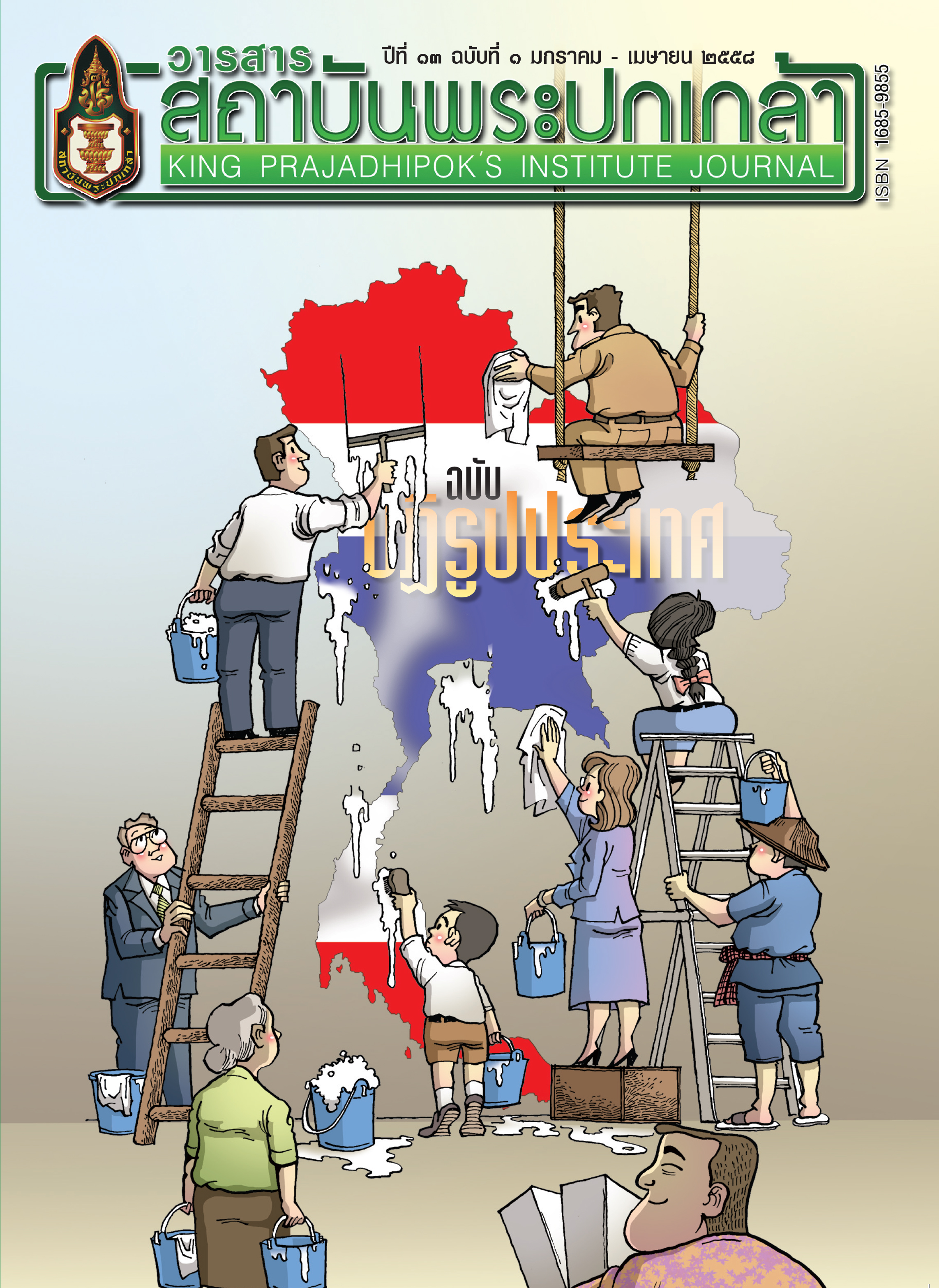The Selection System for the Suitable Representatives in Thai Society
Main Article Content
Abstract
The selection system of the representatives in Thai Society is determination how to choose members of the House of Representatives and Senators, it is unavoidable to involve with the process or source of administrative section. On the other hand, the solution of the research may not only related to assemblymen and senators, but also executive section.
The result of this research showed that there are 5 conclusions drawn from inquiring the samples as follows: (1) The selection of a Prime Minister through set up elections directly to people, (2) Political party which has the most voting of proportional representatives must have the authorities to form a government and the chief will be the Prime Minister who separate power between legislative power and executive, (3) The election of representatives still managed by mixed pattern from constituent system to proportion. Moreover, the numbers of both kinds of representatives must be the same and the vote of proportional representation would define the members along with the election in Germany. (4) Being the same tradition of selection and component representatives and senators under the Constitution of the Kingdom of Thailand B.E. 2540 and B.E. 2550, (5) Focus on considering the high qualification of representatives, building strong moral system and the system of checks and balances regardless of the selection and component of political office holders.
Every process can be obtained by the new Constitution of Thailand must be rewritten and listen to the needs or majority opinions of people as resolution. Also, process (4) and (5) should be added to other processes (process 1, 2 or 3) for seriousness and effectiveness of concrete controlling, and this would help the qualitative democracy more or less successfully.
Article Details
@ 2020 King Prajadhipok's Institute The Government Complex Commemorating All Right Reserved.
References
นรนิติ เศรษฐบุตร. ๒๕๕๑. “รัฐธรรมนูญ ๕๐ : กับการปฏิรูปการเมือง ครั้งที่๒” ใน พิศรัฐธรรมนูญ. (วุฒิสาร ตันไชย บรรณาธิการ) พิมพ์ครั้งที่ ๑ สถาบันพระปกเกล้า กรุงเทพฯ : ส.เจริญการพิมพ์.
ราชกิจจานุเบกษา. ฉบับกฤษฎีกา ๒๕๔๙. รัฐธรรมนูญแห่งราชอาณาจักรไทย (ฉบับชั่วคราว) พุทธศักราช ๒๕๔๙. เล่ม ๑๒๓ ตอนที่ ๑๐๒ ก วันที่ ๑ ตุลาคม ๒๕๔๙ กรุงเทพมหานคร : โรงพิมพ์สำนักเลขาธิการ คณะรัฐมนตรี.
อมร จันทรสมบูรณ์. ๒๕๕๒. เราต้องการ Statesman (บทสัมภาษณ์) หนังสือพิมพ์ไทยโพสต์ ฉบับพิเศษ ขึ้นปี ที่ ๔ วันพุธที่ ๒๑ ตุลาคม ๒๕๕๒.
อมร จันทรสมบูรณ์. ๒๕๓๗. คอนสติติวชั่นแนลลิสม์ (Constitutionalism): ทางออกของประเทศไทย. กรุงเทพฯ: สถาบันนโยบายศึกษา.
Andrews, Josephine T., and Robert W.Jackman. 2005. ‘Strategic Fools : Electoral Rule Choice under Extreame Uncertainty’. Electoral Studies. 24: 65-84.
Banting,Keith G., and Richard Simeon. 1985. “Introduction: The Politics Of Constitutional Change”. In Keith G. Banting and Richard Simeon (eds.), The Politics of Constitutional Change in Industrial Nations: Redesigning The State. London: Macmillan.
Birch, Sarah, FrancesMillard, MarinaPopescu, and Kieran Williams. 2002. Embodying Democracy: Electoral System Design in Post-Communist Europe. Basingstoke : Palgrave Macmillan.
Benoit, Kenneth. 2004. “Models of Electoral System Change”. Electoral Studies. 23: 363-89.
Boix, Carles. 1999. ‘Setting the Rules of the Game:The Choice of Electoral Systems in Advanced Democracy’. American Political Science Review. 93: 609-24.
Colomer, Josep M. 2004a. “The Strategy and History of Electoral System Choice”. In Colomer 2004b: 3-78.
Dawisha, Adeed, and Larry Diamond. 2006. ‘Electoral System Today: Iraq’s Year of Voting Dangerously’. Journal of Democracy. 17: 89-103.
Fraenkel, Jon. 2001. “The Alternative Vote System in Fiji : Electoral Engineering or Ballot-Rigging?” Commonwealth and Comparative Politics. 39:1-31.
Friedrich, Carl J. 1949. ‘Rebuilding the German Constitution I’. American Political Science Review. 43: 461-82.
Ishiyama, John T. 1997. ‘Transitional Electoral Systems in Post-Communist Eastern Europe’. Political Science Quartery. 112:95-115.
Rawls, John. 1971. A Theory of Justice. Cambridge, MA: Belknap Press of Harvard University Press.
Shugart, Matthew Soberg. 2001. “Extreme” Electoral Systems and the Appeal of the Mixed-Member Alternative. In Shugart and Wattenberg 2001d: 25-51.
Shugart, Matthew Soberg, and Martin P. Wattenberg. 2001c. ‘Conclusion: Are Mixed-Member Electoral Systems the Best of Both Worlds, In Shugart and Wattenberg 2001d: 571-96.
Tsebilis, George. 1990. Nested Games : Rational Choice in Comparative Politics. Berkeley: University of California Press.


